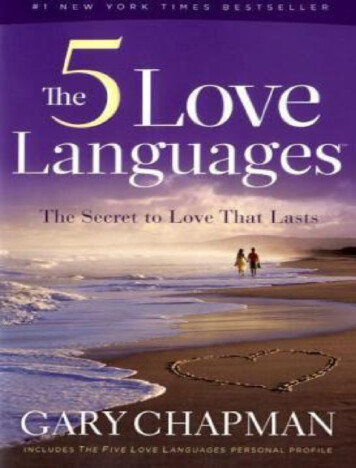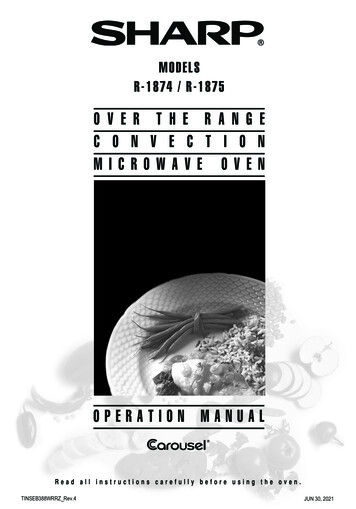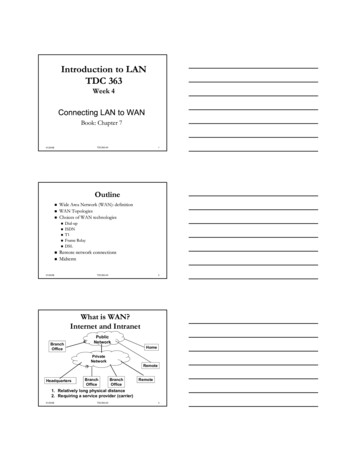
Transcription
T Five L LHEOVEANGUAGES
THE Five LOVE LANGUAGESHow to Express Heartfelt Commitment toYour Mate
G CARYHAPMANNORTHFIELD PUBLISHINGCHICAGO
1992, 1995, 2004by Gary D. ChapmanAll rights reserved. No part of this book may be reproducedin any form without permission in writing from the publisher,except in the case of brief quotations embodied in criticalarticles or reviews.Scripture quotations, unless noted otherwise, are takenfrom the Holy Bible: New International Version . Copyright 1973, 1978, 1984, International Bible Society. Used bypermission of Zondervan Publishing House. All rightsreserved.The use of selected references from various versions of theBible in this publication does not necessarily implypublisher endorsement of the versions in their entirety.ISBN: 978-1-881273-15-6
To Karolyn,Shelley, and Derek
Other Great Books by Gary ChapmanThe Five Love Languages Men’s EditionThe Five Love Languages Gift EditionThe Five Love Languages of ChildrenThe Five Love Languages of TeenagersThe Five Love Languages for SinglesYour Gift of LoveParenting Your Adult ChildThe Other Side of LoveLoving SolutionsFive Signs of a Loving FamilyToward a Growing MarriageHope for the SeparatedCovenant Marriage
CONTENTSAcknowledgments1. What Happens to Love After the Wedding?2. Keeping the Love Tank Full3. Falling in Love4. Love Language #1: Words of Affirmation5. Love Language #2: Quality Time6. Love Language #3: Receiving Gifts7. Love Language #4: Acts of Service8. Love Language #5: Physical Touch9. Discovering Your Primary Love Language10. Love Is a Choice11. Love Makes the Difference12. Loving the Unlovely13. Children and Love Languages14. A Personal WordThe Five Love Languages Profile for Husbands
The Five Love Languages Profile for Wives
ACKNOWLEDGMENTSLove begins, or should begin, at home. For me thatmeans Sam and Grace, Dad and Mom, who have loved mefor more than fifty years. Without them I would still beseeking love instead of writing about it. Home also meansKarolyn, to whom I have been married for more than fortyyears. If all wives loved as she does, fewer men would belooking over the fence. Shelley and Derek are now out ofthe nest, exploring new worlds, but I feel secure in thewarmth of their love. I am blessed and grateful.I am indebted to a host of professionals who haveinfluenced my concepts of love. Among them arepsychiatrists Ross Campbell, Judson Swihart, and ScottPeck. For editorial assistance, I am indebted to DebbieBarr and Cathy Peterson. The technical expertise of TriciaKube and Don Schmidt made it possible to meetpublication deadlines. Last, and most important, I want toexpress my gratitude to the hundreds of couples who, overthe past thirty years, have shared the intimate side of theirlives with me. This book is a tribute to their honesty.
chapter one
W HHATAPPENS TOL AOVEFTER THEW?EDDINGAt 30,000 feet, somewhere between Buffalo and Dallas,he put his magazine in his seat pocket, turned in mydirection, and asked, “What kind of work do you do?”“I do marriage counseling and lead marriageenrichment seminars,” I said matter-of-factly.“I’ve been wanting to ask someone this for a longtime,” he said. “What happens to the love after you getmarried?”Relinquishing my hopes of getting a nap, I asked,“What do you mean?”“Well,” he said, “I’ve been married three times, andeach time, it was wonderful before we got married, butsomehow after the wedding it all fell apart. All the love Ithought I had for her and the love she seemed to have forme evaporated. I am a fairly intelligent person. I operate asuccessful business, but I don’t understand it.”“How long were you married?” I asked.“The first one lasted about ten years. The second time,we were married three years, and the last one, almost sixyears.”“Did your love evaporate immediately after the
wedding, or was it a gradual loss?” I inquired.“Well, the second one went wrong from the verybeginning. I don’t know what happened. I really thought weloved each other, but the honeymoon was a disaster, andwe never recovered. We only dated six months. It was awhirlwind romance. It was really exciting! But after themarriage, it was a battle from the beginning.“In my first marriage, we had three or four good yearsbefore the baby came. After the baby was born, I felt likeshe gave her attention to the baby and I no longer mattered.It was as if her one goal in life was to have a baby, and afterthe baby, she no longer needed me.”“Did you tell her that?” I asked.“Oh, yes, I told her. She said I was crazy. She said I didnot understand the stress of being a twenty-four-hour nurse.She said I should be more understanding and help hermore. I really tried, but it didn’t seem to make anydifference. After that, we just grew further apart. After awhile, there was no love left, just deadness. Both of usagreed that the marriage was over.“My last marriage? I really thought that one would bedifferent. I had been divorced for three years. We datedeach other for two years. I really thought we knew what wewere doing, and I thought that perhaps for the first time Ireally knew what it meant to love someone. I genuinely feltthat she loved me.“After the wedding, I don’t think I changed. I continuedto express love to her as I had before marriage. I told her
how beautiful she was. I told her how much I loved her. I toldher how proud I was to be her husband. But a few monthsafter marriage, she started complaining; about petty thingsat first—like my not taking the garbage out or not hangingup my clothes. Later, she went to attacking my character,telling me she didn’t feel she could trust me, accusing me ofnot being faithful to her. She became a totally negativeperson. Before marriage, she was never negative. She wasone of the most positive people I have ever met. That is oneof the things that attracted me to her. She nevercomplained about anything. Everything I did was wonderful,but once we were married, it seemed I could do nothingright. I honestly don’t know what happened. Eventually, I lostmy love for her and began to resent her. She obviously hadno love for me. We agreed there was no benefit to our livingtogether any longer, so we split.“That was a year ago. So my question is, Whathappens to love after the wedding? Is my experiencecommon? Is that why we have so many divorces in ourcountry? I can’t believe that it happened to me three times.And those who don’t divorce, do they learn to live with theemptiness, or does love really stay alive in somemarriages? If so, how?”The questions my friend seated in 5A was asking are thequestions that thousands of married and divorced persons
are asking today. Some are asking friends, some areasking counselors and clergy, and some are askingthemselves. Sometimes the answers are couched inpsychological research jargon that is almostincomprehensible. Sometimes they are couched in humorand folklore. Most of the jokes and pithy sayings containsome truth, but they are like offering an aspirin to a personwith cancer.The desire for romantic love in marriage is deeplyrooted in our psychological makeup. Almost every popularmagazine has at least one article each issue on keepinglove alive in a marriage. Books abound on the subject.Television and radio talk shows deal with it. Keeping lovealive in our marriages is serious business.With all the books, magazines, and practical helpavailable, why is it that so few couples seem to have foundthe secret to keeping love alive after the wedding? Why is itthat a couple can attend a communication workshop, hearwonderful ideas on how to enhance communication, returnhome, and find themselves totally unable to implement thecommunication patterns demonstrated? How is it that weread a magazine article on “101 Ways to Express Love toYour Spouse,” select two or three ways that seemespecially good to us, try them, and our spouse doesn’teven acknowledge our effort? We give up on the other 98ways and go back to life as usual.
We must be willing to learn our spouse’s primary lovelanguage if we are to be effective communicators of love.The answer to those questions is the purpose of thisbook. It is not that the books and articles already publishedare not helpful. The problem is that we have overlooked onefundamental truth: People speak different love languages.In the area of linguistics, there are major languagegroups: Japanese, Chinese, Spanish, English, Portuguese,Greek, German, French, and so on. Most of us grow uplearning the language of our parents and siblings, whichbecomes our primary or native tongue. Later, we may learnadditional languages but usually with much more effort.These become our secondary languages. We speak andunderstand best our native language. We feel mostcomfortable speaking that language. The more we use asecondary language, the more comfortable we becomeconversing in it. If we speak only our primary language andencounter someone else who speaks only his or herprimary language, which is different from ours, ourcommunication will be limited. We must rely on pointing,grunting, drawing pictures, or acting out our ideas. We cancommunicate, but it is awkward. Language differences arepart and parcel of human culture. If we are to communicateeffectively across cultural lines, we must learn the languageof those with whom we wish to communicate.
In the area of love, it is similar. Your emotional lovelanguage and the language of your spouse may be asdifferent as Chinese from English. No matter how hard youtry to express love in English, if your spouse understandsonly Chinese, you will never understand how to love eachother. My friend on the plane was speaking the language of“Affirming Words” to his third wife when he said, “I told herhow beautiful she was. I told her I loved her. I told her howproud I was to be her husband.” He was speaking love, andhe was sincere, but she did not understand his language.Perhaps she was looking for love in his behavior and didn’tsee it. Being sincere is not enough. We must be willing tolearn our spouse’s primary love language if we are to beeffective communicators of love.My conclusion after thirty years of marriage counseling isthat there are basically five emotional love languages—fiveways that people speak and understand emotional love. Inthe field of linguistics a language may have numerousdialects or variations. Similarly, within the five basicemotional love languages, there are many dialects. Thataccounts for the magazine articles titled “10 Ways to LetYour Spouse Know You Love Her,” “20 Ways to Keep YourMan at Home,” or “365 Expressions of Marital Love.” Thereare not 10, 20, or 365 basic love languages. In my opinion,there are only five. However, there may be numerous
dialects. The number of ways to express love within a lovelanguage is limited only by one’s imagination. Theimportant thing is to speak the love language of yourspouse.We have long known that in early childhooddevelopment each child develops unique emotionalpatterns. Some children, for example, develop a pattern oflow self-esteem whereas others have healthy self-esteem.Some develop emotional patterns of insecurity whereasothers grow up feeling secure. Some children grow upfeeling loved, wanted, and appreciated, yet others grow upfeeling unloved, unwanted, and unappreciated.The children who feel loved by their parents and peerswill develop a primary emotional love language based ontheir unique psychological makeup and the way theirparents and other significant persons expressed love tothem. They will speak and understand one primary lovelanguage. They may later learn a secondary love language,but they will always feel most comfortable with their primarylanguage. Children who do not feel loved by their parentsand peers will also develop a primary love language.However, it will be somewhat distorted in much the sameway as some children may learn poor grammar and havean underdeveloped vocabulary. That poor programmingdoes not mean they cannot become good communicators.But it does mean they will have to work at it more diligentlythan those who had a more positive model. Likewise,children who grow up with an underdeveloped sense of
emotional love can also come to feel loved and tocommunicate love, but they will have to work at it morediligently than those who grew up in a healthy, lovingatmosphere.Seldom do a husband and wife have the same primaryemotional love language. We tend to speak our primarylove language, and we become confused when our spousedoes not understand what we are communicating. We areexpressing our love, but the message does not comethrough because we are speaking what, to them, is aforeign language. Therein lies the fundamental problem,and it is the purpose of this book to offer a solution. That iswhy I dare to write another book on love. Once we discoverthe five basic love languages and understand our ownprimary love language, as well as the primary lovelanguage of our spouse, we will then have the neededinformation to apply the ideas in the books and articles.Once you identify and learn to speak your spouse’sprimary love language, I believe that you will havediscovered the key to a long-lasting, loving marriage. Loveneed not evaporate after the wedding, but in order to keepit alive most of us will have to put forth the effort to learn asecondary love language. We cannot rely on our nativetongue if our spouse does not understand it. If we wanthim/her to feel the love we are trying to communicate, we
must express it in his or her primary love language.
chapter two
KEEPING THEL T FOVEANKULLLove is the most important word in the English language—and the most confusing. Both secular and religiousthinkers agree that love plays a central role in life. We aretold that “love is a many-splendored thing” and that “lovemakes the world go round.” Thousands of books, songs,magazines, and movies are peppered with the word.Numerous philosophical and the
5. Love Language #2: Quality Time 6. Love Language #3: Receiving Gifts 7. Love Language #4: Acts of Service 8. Love Language #5: Physical Touch 9. Discovering Your Primary Love Language 10. Love Is a Choice 11. Love Makes the Difference 12. Loving the Unlovely 13. Children and Love Languages 14. A Personal Word The Five Love Languages Profile for Husbands. The Five Love Languages Profile











